January 22, 2025 | 04:37 GMT +7
January 22, 2025 | 04:37 GMT +7
Hotline: 0913.378.918
January 22, 2025 | 04:37 GMT +7
Hotline: 0913.378.918
Long Phu Durian Cooperative (Long Tan Commune, Phu Rieng District, Binh Phuoc) has been in operation for 2 years now. The cooperative has 15 members with a total durian growing area of 32 ha. The cooperative members are people who have grown durian for many years, but they only started aiming for standard production when they joined the cooperative.
Pham Dinh Chung, a member of Long Phu Durian Cooperative, said that his family had been growing durians for 4 years. His family used to grow durian without any specific procedure. When he joined Long Phu Durian Cooperative, he began to cultivate organic durian with the guidance and support of the cooperative’s Chairman of the Board of Directors Nguyen Huu Nam.
Producing durian in the organic direction, Chung speculated that his durian fruit would gain the opportunity to export abroad. This production method also helps his orchard develop more sustainably than orchards that only use fertilizers and chemical drugs, thereby bringing long-term economic benefits.
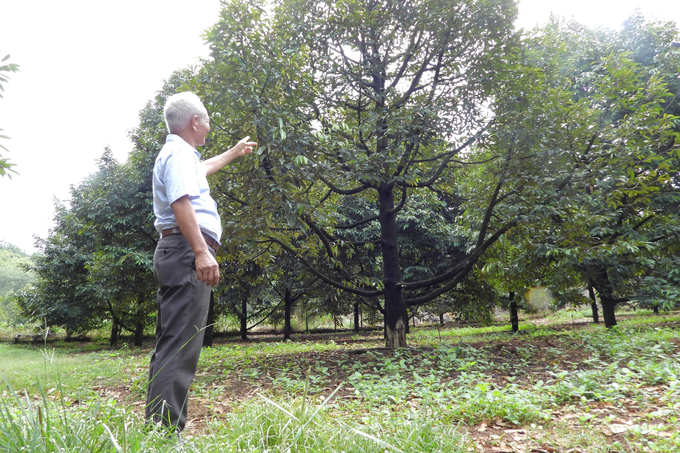
Long Phu Durian Cooperative is carrying out procedures to be granted planting area codes, through which the cooperative can participate in the export market. Photo: Tran Trung.
Chairman of the Board of Directors of Long Phu Durian Cooperative Nguyen Huu Nam is actually a man with more than 20 years of growing this fruit. In the beginning his durian orchard was full of sick and dead trees. After a period of research, he gained a big finding: “Trees are like people. if you keep using a lot of toxic chemicals in the orchard, the soil will harden, squeezing out the trees’ chance of growth.”
Since then, Nam has produced durian according to a procedure that reduces inorganic fertilizers and increases organic fertilizers. Ample application of organic fertilizers has created a favorable environment for beneficial organisms to develop. Earthworms are considered a great help to improve the soil. They make the soil porous, and thus durian roots develop well. When it rains, the water will follow the traces of earthworms to seep into the ground and increase soil moisture.
Thanks to organic production, for many years now, the survival rate of trees in Nam's durian garden is normally up to 99%. Apart from the organic procedure, Nam's durian orchard has also been cultivated according to VietGAP standards.
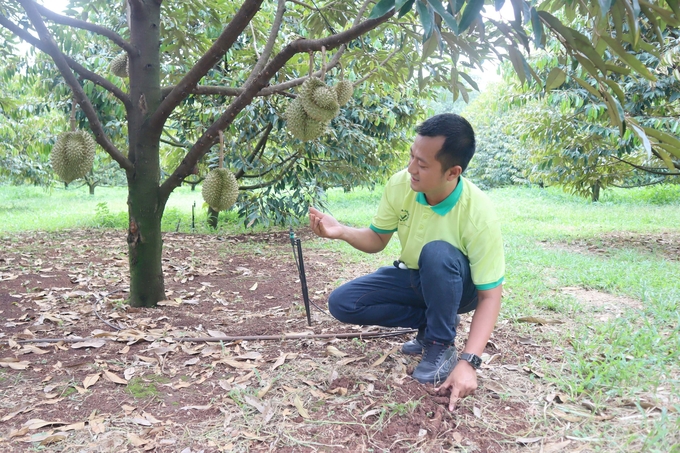
Binh Phuoc Digital Agricultural Service Cooperative is also one of the cooperatives that are actively preparing the necessary works to participate in the durian export market. Photo: Tran Trung.
The fact that China agreed to allow Vietnam to export durian to this market through official route made the members of the Long Phu Durian Cooperative thrive with excitement.
Long Phu Durian Cooperative is carrying out procedures to be granted planting area codes, through which the cooperative can participate in the export market. The cooperative's current durian output is 400 tons/year and will increase to 1,000 tons in the near future. If the export proves to possess no obstacles, the cooperation would expand the durian growing area and further increase output as many farmers in the region urged to become a member of Long Phu Durian Cooperative.
Binh Phuoc Digital Agricultural Service Cooperative (Phuoc Long town, Binh Phuoc) is also one of the cooperatives that are actively preparing the necessary works to participate in the durian export market, especially in the digital transformation stage.
According to Nguyen Minh Hieu, Deputy Director of Binh Phuoc Digital Agricultural Service Cooperative, the cooperative’s function is to disseminate information about garden electronic diaries for farmers, help localities systematize data, proactively link the supply – demand chain, provide consults on materials, fertilizers, care techniques and garden design, use orchard care technology, build a link chain between farmers and purchasing channels while reducing intermediaries to bring stability to agro-products.
Models with small, inefficient production and lack of value chain linkages have always been a problem limiting Vietnam's fruit export capacity, including durian. In the coming period, next to investments in processing technology and more attention to the domestic market, Binh Phuoc Digital Agricultural Service Cooperative aims to promote digital transformation to help farmers improve productivity and product quality, optimize production, reduce costs, be transparent and accurate in terms of information, connect supply - demand, overcome the lack of information about the market," said Deputy Director Nguyen Minh Hieu.
Translated by Samuel Pham

(VAN) Mr. Johan van den Ban - CEO of De Heus Vietnam, encouraged international businesses to come to Vietnam to see firsthand the investment potential in the agricultural sector.
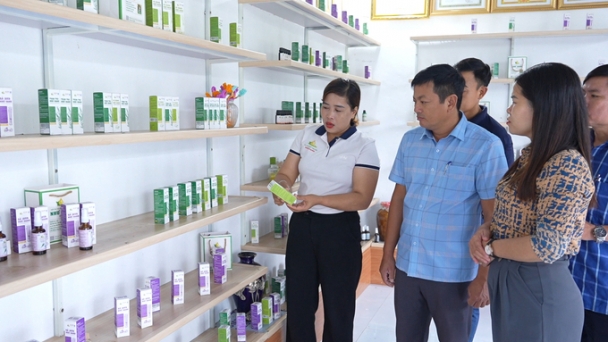
(VAN) The Nhu Oanh essential oil cooperative has expanded its medicinal plant cultivation area to 60 hectares and supplies over 300.000 seedlings annually.
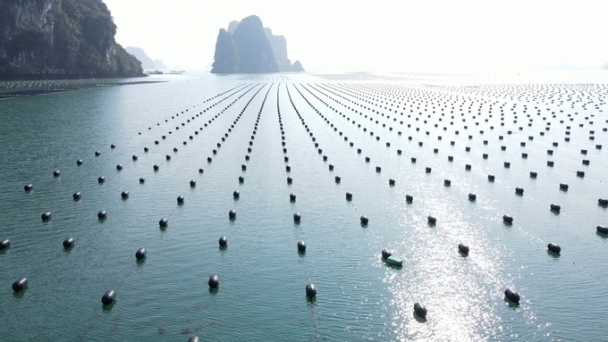
(VAN) Deputy Minister of Agriculture and Rural Development Phung Duc Tien emphasized this at the conference on ‘Development of mollusk and seaweed production’ held on the morning of December 26 in Nam Dinh.
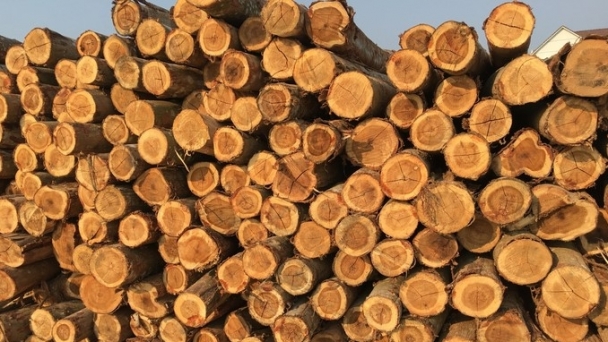
(VAN) Small planted forest timber is currently priced at 1.5 million VND/ton; large timber is priced at up to 1.8 million VND/ton; large timber with FSC certification is priced 20-30% higher than normal large timber.
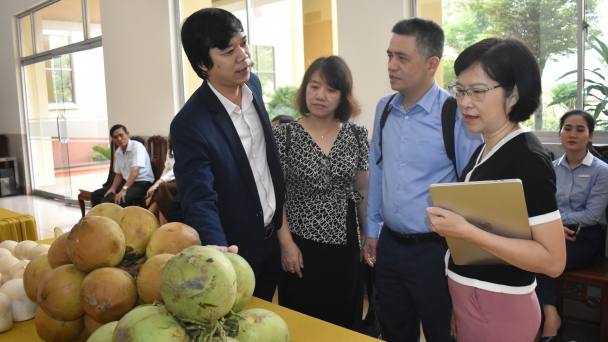
(VAN) The Vietnam Coconut Association has noted that the water coconut industry is thriving in Vietnam. Nevertheless, its development is still uneven, suggesting that there is a substantial untapped opportunity to attract foreign investors.
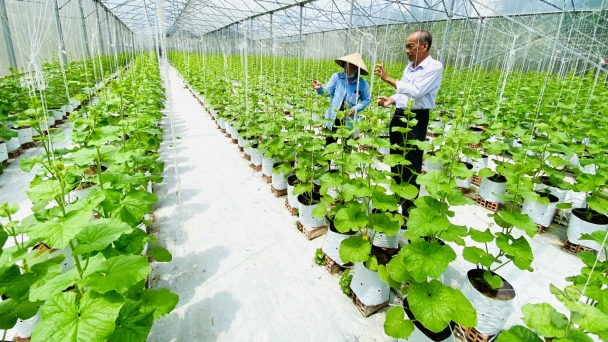
(VAN) According to the development plan for Can Tho in the 2021-2030 period, with a vision for 2045, the city will establish 7 high-tech agricultural zones and 2 concentrated livestock breeding areas.
/2024/12/17/1117-0-nongnghiep-231112.jpg)
(VAN) Spirulina products of a young girl in Da Nang city are currently not only present in many major provinces and cities in the country but also exported.